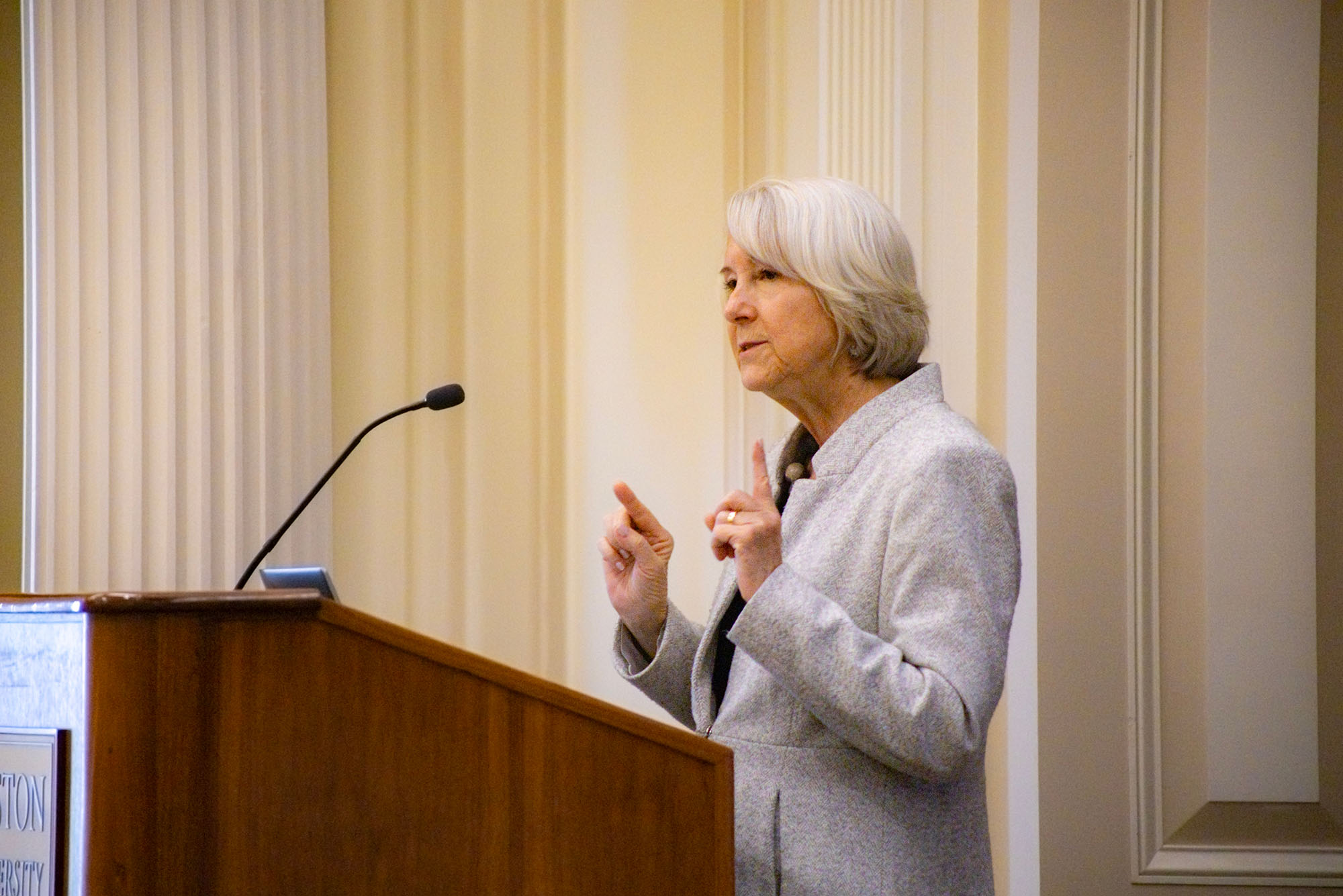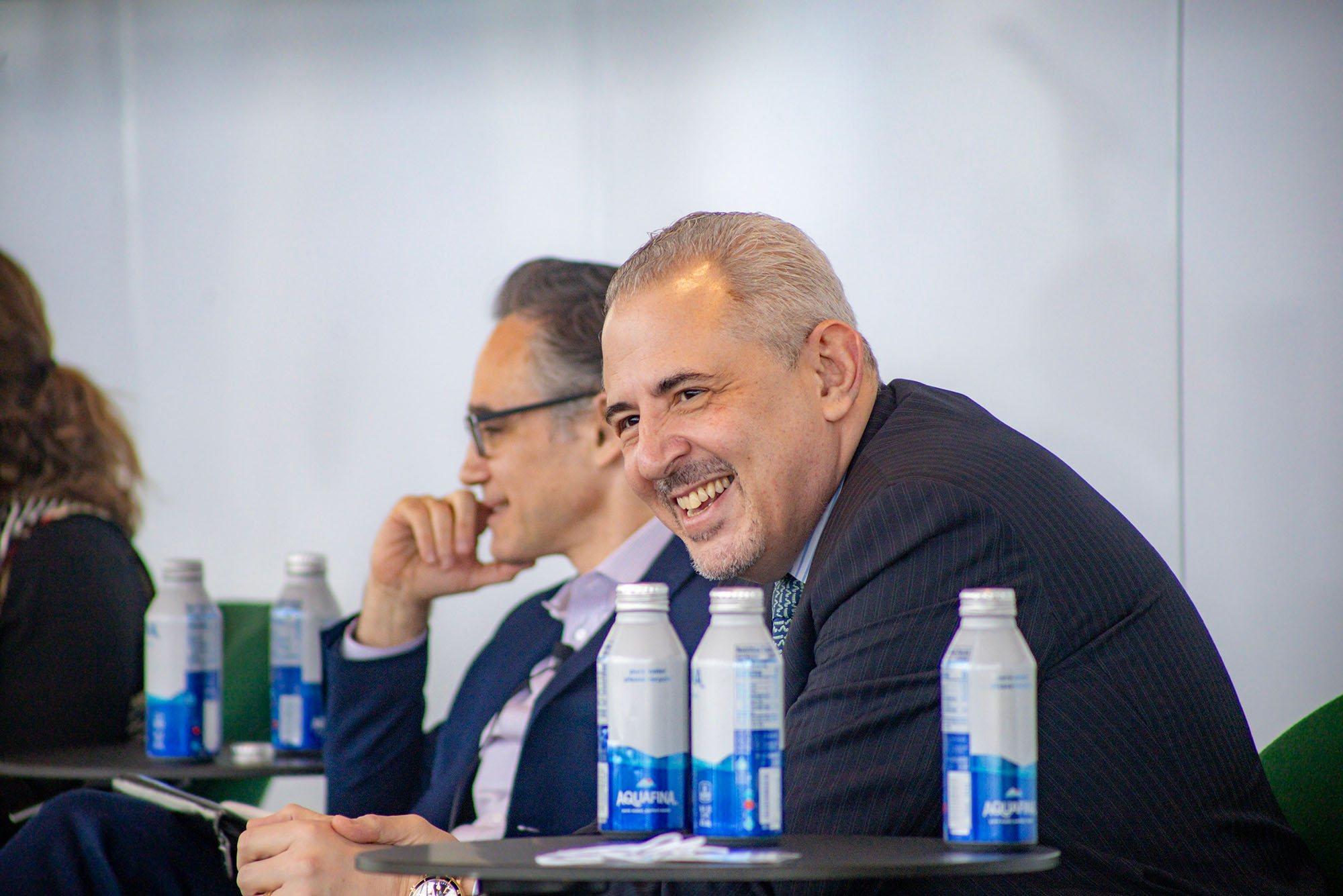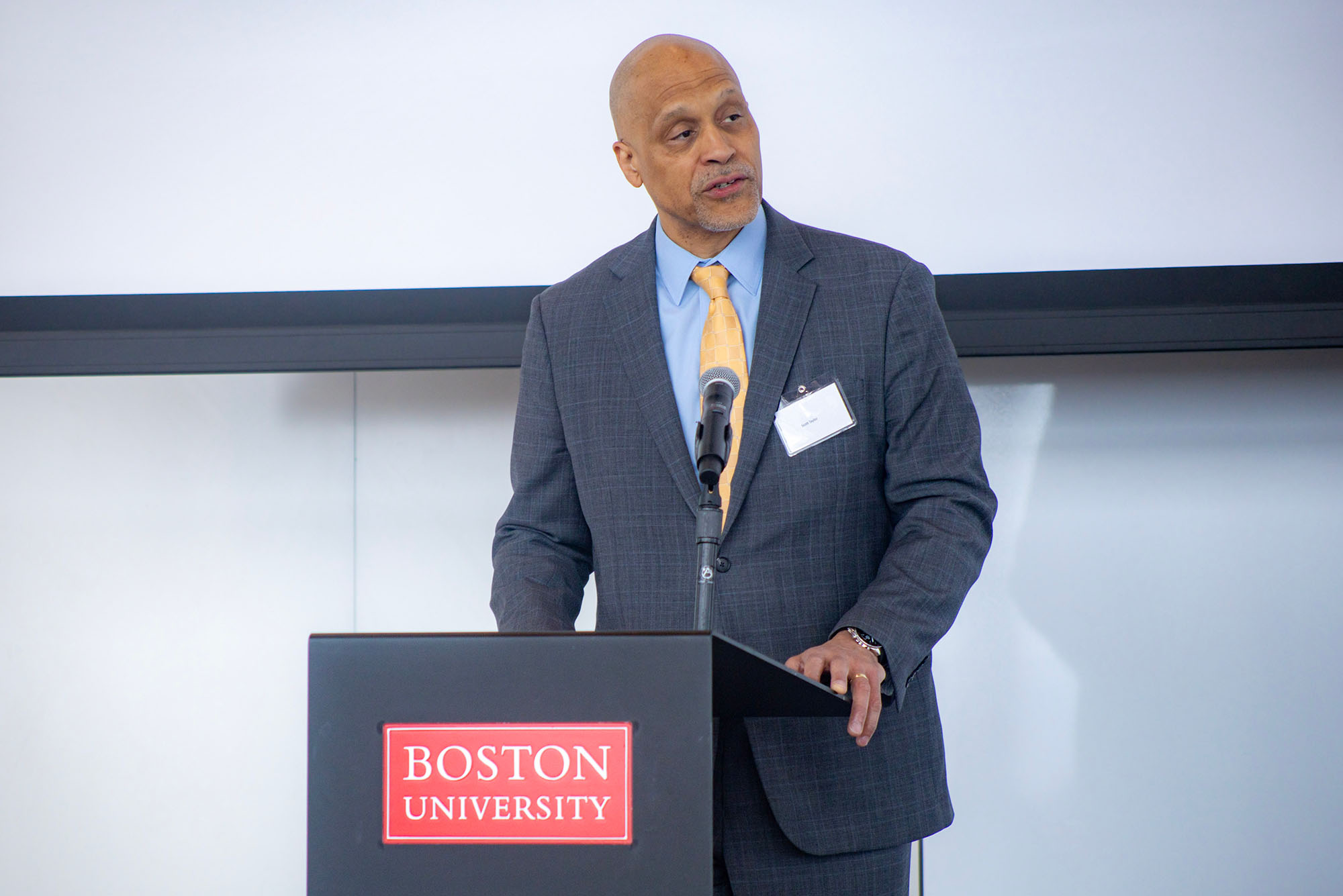Alum, a Former Peace Corps Leader, Fetes BU Pardee at 10th Anniversary Celebration
Carrie Hessler-Radelet (CAS’79, Hon.’16) says global turmoil offers a chance to do foreign assistance better

Keynote speaker Carrie Hessler-Radelet (CAS’79, Hon.’16) exhorted Pardee to continue its mission of fostering sustainable peace and international development.
Alum, a Former Peace Corps Leader, Fetes BU Pardee at 10th Anniversary Celebration
Carrie Hessler-Radelet (CAS’79, Hon.’16) says global turmoil offers a chance to do foreign assistance better
The ongoing shutdown of the US Agency for International Development (USAID) continues to upend American efforts against global poverty, yet it offers an opportunity to do development aid better. That was former Peace Corps director Carrie Hessler-Radelet’s message to guests celebrating the 10th anniversary of Boston University’s Frederick S. Pardee School of Global Studies.
“Without question, the past few months have tested us deeply,” Hessler-Radelet (CAS’79, Hon.’16) said in her keynote address to a luncheon audience April 4 at the Metcalf Trustee Center. “Development and humanitarian programs have ended abruptly, and this country’s commitment to soft power and the three Ds—development, diplomacy, and defense, working together in concert—is in peril. Long-standing global partnerships between our nation and others are strained and, in some cases, broken.”
USAID spent $68 billion in 2023 on food, healthcare, and other assistance to scores of nations, accounting for less than 1 percent of federal spending. President Trump has been shuttering the agency after calling the spending “totally unexplainable,” and Elon Musk, who is heading the administration’s federal retrenchment, called USAID “a criminal organization,” without elaboration. The US Supreme Court last month rejected the administration’s pause on congressionally approved foreign aid payments, but didn’t set a deadline for spending them.
Without question, the last few months have tested us deeply.
Hessler-Radelet is president and CEO of Maryland-based Global Communities, a development nonprofit operating in more than 30 countries. “We’ve lost most of our lifesaving USAID programs,” she said. “We’ve had to make impossible decisions to leave dozens of countries and lay off thousands of employees we love and trust.”
Still, she said, partners in those countries describe this moment as a turning point. “Something new is coming that needed to happen,” she said. “Because if we’re honest, some things about our sector needed to change,” with people in developing nations deserving more say in addressing local poverty.
Hessler-Radelet, who served as the Peace Corps’ 19th director, from 2014 until 2017, continued: “Local leaders bring knowledge born of lived experience, cultural context, and long-term commitment that external actors, no matter how good they are, just cannot replicate…. For too long, development was designed from the outside in—by donors or implementers far removed from the communities they aim to serve. But today’s disruption is calling us to listen more closely, to act more inclusively.”
She said schools such as Pardee must train future leaders by emphasizing the perspectives of developing nations, diversifying and expanding readings in courses, and confronting colonizing attitudes in the development field. “These are things that I know you are already doing,” she said. “This is what Pardee does for all of you who are students. It gives you the tools, the language, and the perspective to lead with empathy and courage. It stretches your imagination and sharpens your moral compass. It reminds you that knowledge, when paired with compassion and humility, can be transformational.”
Hessler-Radelet also urged the school to push on with its founder’s goal of promoting “peace that lasts,” adding that students can pursue that in any career, not just in global development. “We can nurture peace wherever we are,” she said, “using the skills we have developed here.”
The late Frederick S. Pardee (Questrom’54,’54, Hon.’06) donated $50 million to endow and support his namesake school, which has a stated mission of “improving the human condition through rigorous and creative education, path-breaking interdisciplinary research, and innovative initiatives to make a real-world difference in the critical challenges humanity faces.”
The school has about 700 undergraduate and graduate students and 40 faculty, 5 undergraduate majors, 6 master’s degree programs, and 8 research centers, institutes, and initiatives: the African Studies Center, the Center for the Study of Asia, the Center for the Study of Europe, the Center for Latin American Studies, the Institute on Culture, Religion & World Affairs, the Global Development Policy Center, the Middle East-North Africa Initiative, and the Frederick S. Pardee Center for the Study of the Longer-Range Future, founded as a stand-alone entity in 2000 with support from Pardee.
The school’s decennial observance, which drew more than 100 attendees, included panel discussions at the Duan Family Center for Computing & Data Sciences, featuring Boston-based leaders who work with immigrants and Pardee alumni who work for peace and development initiatives. (Technically, they graduated from the College of Arts & Sciences before the Pardee School of Global Studies existed, but the latter, a specialized school within CAS for international relations majors, grandfathered them as alumni.) Many of the panelists also touched on the theme of the fire hose of change out of Washington in the ways the US interacts with, and aids, other nations.

“We’re very much in a crisis moment for the Western development industry,” said David Barth (Pardee’92), vice president of international programs for Save the Children. “And I don’t say that as a pejorative,” as it is possible to innovate new ways of improving the human condition. Still, a “subtext” on much social media chatter holds that “empathy is for the weak,” he added. “That is an absolutely false choice.”
“If you are great as a great power, then you don’t have to be extortionate,” he declared to applause.
Adam Lupel (Pardee’92), vice president and CEO of the International Peace Institute, a New York nonprofit, said the act of starving government development assistance is not confined to the United States; Europe has also cut back in order to boost its defense aid to Ukraine in that country’s war with Russia.
“This isn’t just about Mr. Trump,” Lupel said. “This is a function of larger trends.”
The panelists also offered hope to students in the audience. Lupel quoted Oscar Wilde: “‘A cynic is someone who knows the cost of everything and the value of nothing.’ And I think it’s really important to shift the conversation to the value [of development aid], away from the cost.” Recent increases in the numbers of NGOs and public-private partnerships in international development are critically important, he said.
Cate Oswald, principal chief program officer of Boston-based Partners in Health, said her organization hosts university chapters in 38 states, offering students a chance to assist the nonprofit’s mission of bringing modern medicine to poor nations.

The lifeline of optimism earned the thanks of Pardee Dean Scott Taylor after the panels concluded: “I thought that this was going to be kind of a downer,” he said.
“These presentations wove together some of the key themes we hold dear in the Pardee School,” Taylor said. “Leveraging, indeed celebrating, our Boston location [and] the twin benefits of honoring our influential and immensely successful alumni and examining two issues that are essential to our world: peace-building and international development.”
Taylor also presented the school’s first Dean’s International Leadership Award to his predecessor, Adil Najam, founding dean of Pardee and president of WWF International, the eminent conservation and climate group.
Days before the decennial celebration, the school announced another milestone: it will build a 12-story home at 250 Bay State Road, consolidating faculty and students who are currently dispersed among seven brownstones. Construction is to begin in 2026 and will take an estimated two years.
Fred Pardee described himself as a ‘dreamer of the future,’ and we are proud to carry his name and vision forward.
BU President Melissa Gilliam told attendees that the structure “will not only be a visually stunning landmark on the Charles [River Campus] but a dynamic learning space that will enhance collaboration across Pardee centers and institutes.”
Hailing the school’s late founder as “one of Boston University’s most prominent and visionary benefactors,” Gilliam noted that Pardee had been born during the economic catastrophe of the Great Depression and matured during the human catastrophe of World War II. “Fred remained a committed internationalist and optimistic futurist, with a passionate determination to improve the human condition,” she said. “Fred Pardee described himself as a ‘dreamer of the future,’ and we are proud to carry his name and vision forward to help build the positive future to which he dedicated his philanthropy.”

Comments & Discussion
Boston University moderates comments to facilitate an informed, substantive, civil conversation. Abusive, profane, self-promotional, misleading, incoherent or off-topic comments will be rejected. Moderators are staffed during regular business hours (EST) and can only accept comments written in English. Statistics or facts must include a citation or a link to the citation.